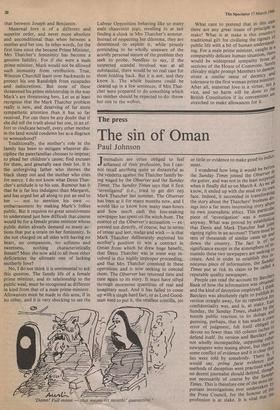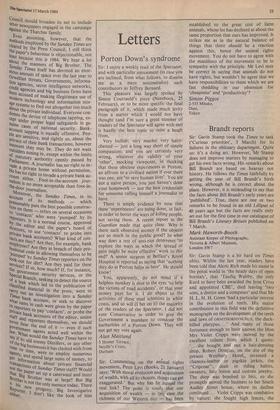The press
The sin of Oman
Paul Johnson
Journalists are often obliged to feel ashamed of their 'profession, but I can- not recall anything quite so distasteful as the vendetta against the Thatcher family be- ing waged by the Observer and the Sunday Times. The Sunday Times says that it first `investigated' (i.e., tried to get dirt on) Mark Thatcher last summer. The Observer has been at it for many months now, and I would like to know how many man-hours and how much cash this loss-making newspaper has spent on the witch-hunt. The essence of the Observer's accusation — ex- pressed not directly, of course, but in terms of smear and leer, nudge and wink — is that Mark Thatcher deliberately exploited his mother's position to win a contract in Oman from which he drew huge benefit, that Denis Thatcher was in some way in- volved in this highly improper proceeding, and that Mrs Thatcher connived in these operations and is now seeking to conceal them. The Observer has returned time and time again to its story. It must have sifted through enormous quantities of real and imaginary mud. And it has failed to come up with a single hard fact, or as Lord Good- man used to put it, the smallest scintilla, jot
'Damn! Full moon — that means six months' quarantine.'
or tittle or evidence to make good its indict- ment.
I wondered how long it would be before the Sunday Times joined the Observer in the gutter, and was not in the least surprised, when it finally did so on March 4. As we al know, it ended up with the mud on its owil face. Indeed, it succeeded in transforrning the story about the Thatchers' business do; ings into a far more interesting story ab°11 its own journalistic ethics. This particular piece of 'investigation' was a nor's°. sde anyway. What was proved by establish'ilbt that Denis and Mark Thatcher had .lolun signing rights in an account? There must ude tens of thousands of similar cases UP aria down the country. The fact is of,in significance except in the atmosphere of nuendo these two newpapers are seeking create. And in order to establish this in nocuous piece of information, the Sundae Times put at risk its claim to be called reputable quality newspaper.
People can read the account byi.vs
Barc.wd Bank of how the information was obtain, and the kind of deception employed. I tnifi.is Barclays was absolutely right to publish version straight away, for its reputation 14-'5't confidentiality was, and is, at stake. I-11 Sunday, the Sunday Times, shaken by the hostile public reaction to its doings an ‘s guessing, perhaps, that it has made a crato error of judgment, felt itself obliged to devote no fewer than 165 column inches re defend itself. Its version and BarclaYso' aer not wholly incompatible, supposing t is newspapers were nosing about, but there. _t some conflict of evidence and it is clear Ma/ would say, prima
lies were told by somebody. There methods of deception were practised
no decent journalist should defend, th°1/),Tv not necessarily of course by the Sunday facie evidence WI Times. This is therefore one of the Most Ibv portant investigations ever undertaken the the Press Council, for the honour of the profession is at stake. It is vital that Council. should broaden its net to include other newspapers engaged in the campaign against the Thatcher family.
Even assuming, however, that the
methods employed by the Sunday Times are cleared by the Press Council, I still think the paper's behaviour is objectionable, not least because this is 1984. We hear a lot about the manners of Big Brother. The Sunday Times itself has devoted an enor- mous amount of space over the last year to Orwellian threats. Governments, informa- tion agencies, secret intelligence networks, credit agencies and big business firms have been accused of making illegitimate use of modern technology and information stor- age systems to find out altogether too much about the private individual. Everyone con- demns the device of telephone tapping, i ex- cept under proper legal safeguards in ge- nuine cases of national security. Bank- account tapping is equally offensive. Peo- ple are sensitive, and rightly so, about the privacy of their bank transactions, however Innocent they may be. They do not want °Utsiders nosing in, except within the limits of statutory authority openly passed in- vade Parliament. A journalist has no right to n- vade a private home without permission. He has no right to invade a private bank ac- count either. Foot-in-the-account jour- na m lism is no more acceptable than foot-- the-door journalism. Moreover, the Sunday Times, account of its methods — in which
ich
Presumably puts the best possible construc- oon on them refers on several occasions to 'contacts' who were 'pumped' by its reporters. It is a normal course, approved by the editor and the paper's board of directors, to use 'contacts' to probe into Private bank accounts? What kind of con- tacts are they? Are they, for example, bank e„mployees? Are they in breach of their pro- lessional code in allowing themselves to be PunlPed' by Sunday Times reporters on the look- out for dirt? Are they paid for these
!ry If so, how much? If, for instance, Special security services, or the
q)ecial Branch, seeking to detect the source O,f n.leak which led to the publication of classified material in the press, were to c.,..rrY out an investigation into a Sunday '‘`vinlhat es bank account, or seek to discover
sums in cash were given by the paper
to
private
rePorters to pay 'contacts', or probe the bank accounts of the editor senior staff and reporters themselves, we, should never hear the end of it — even if such rvernmentagents acted well within the _a_w..What would the Sunday Times have to 41.1 if its old enemy Distillers, or any other the big businesses it has clashed with from ti big to time were to employ numerous get Info rms, and spend large sums of money, to ation about private financial transactions of Sunday Times staff? Would haft he. Paper set up a caterwaul and insist ar his is Brother was at large? But Big is oth er is not the only menace today. There Re s new progeny, Big Investigative either.
POrter. I don't like the look of him















































 Previous page
Previous page